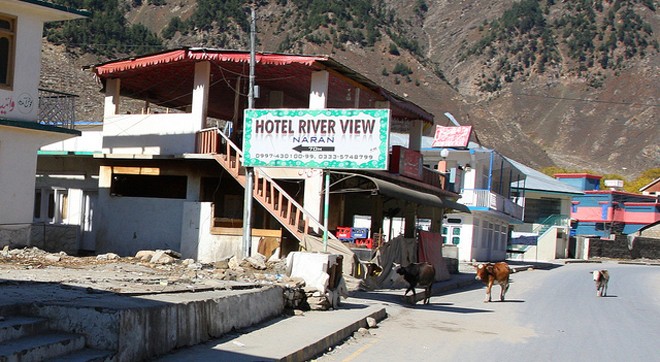
The youth in Naran suffer with the diminishing tourist industry and lack of professional opportunities

Twenty-four-year-old Muhammad Waseem is the manager of Batakundi Hotel, built atop a hill, 14 kilometres north-east of Naran. With a view of the Kunhar river, the hotel is preferred by tourists and trekkers who would rather stay away from the crowded resort of Naran in Kaghan Valley.
Waseem’s father decided to turn their house into a hotel some years ago. Presently, the hotel is the only source of livelihood for the family.
Waseem, who studied commerce in college, decided to work at the hotel when he could not find a job.
Like others in the tourism business in Naran, Waseem and his father wait for the summer season, to earn a living, as there are only a few means of livelihood in the valley. But the past summer has been unusual - there has been little to do in terms of business.
"Ramzan came in the peak tourist season," he says, adding, "Still, we hoped during and after Eidul Fitr we would get enough guests to take care of. But dharnas of Imran Khan and Tahir-ul-Qadri further affected our business."
Waseem adds that there are no jobs in the valley. "People are poor and the younger generation has to do something to help their families to make both ends meet," he says.
According to him, the only prospect for the young people in the valley is to engage in tourism-related activity.
"Last year, in August, we had 100 per cent occupancy. This August was dull, with full occupancy only for eight days," says Sadaqat Ali, assistant manager PTDC Hotel Naran, while blaming the political situation in the country for the loss of tourists.
Naran, capital of the Kaghan valley located in the north-east of Khyber Pukhtunkhwa province, is the mainstay of local tourism industry. Every year thousands of tourists from across the country throng to the valley to enjoy the scenic view of snow-capped peaks, pristine lakes and mesmerising waterfalls.
The summer season in the entire northern area provides employment opportunities to the locals who have no other means of income, except subsistence farming, with insufficient return.
Yet, the area, which attracts thousands of tourists every year, is facing shortage of trained manpower in the hotel Industry.
"If you are trained in hotel management and other related fields, you will be able to serve better and earn better," says Seth Saifullah, president of hotel owners association in Naran.
Most of the people involved in hotel Industry have no proper training in the field. "People want to learn and polish their skills but have limited finances and opportunities," says Asad Khitab, who is a cook in Batakundi Hotel.
The Sustainable Tourism Foundation Pakistan (STFP), a non-government organisation, has been making efforts to help margnalised people to learn the skills to enable them to earn decent livelihoods and promote eco-tourism.
The foundation has been supporting Tourism Promotion Association of Kaghan (T-PAK), an association of local stakeholders of the tourism and hotel industry, by conducting hospitality trainings for the unemployed local youth in different hotel management skills. With the technical and financial assistance of International Labour Organisation (ILO), it has arranged trainings at the doorsteps of beneficiaries in their local settings.
The hospitality trainings needs, according to the local hotel owners, are in the fields of front office management, housekeeping management, food and beverage service and food production. Among others, STFP has designed different training courses for women, including refining handicrafts skills, traditional food preparation and establishing small-scale laundry business.
Seth Saifullah says such trainings have opened up employment opportunities for unemployed youth of Kaghan. Besides, he adds, they fill the gap of unskilled hotel staff in the valley and help in improving the standard of service of local hotel industry.
However, Waseem believes, such training initiatives should continue so that those who did not get the opportunity to train before may get a chance to learn some skills required in the hoteling sector.